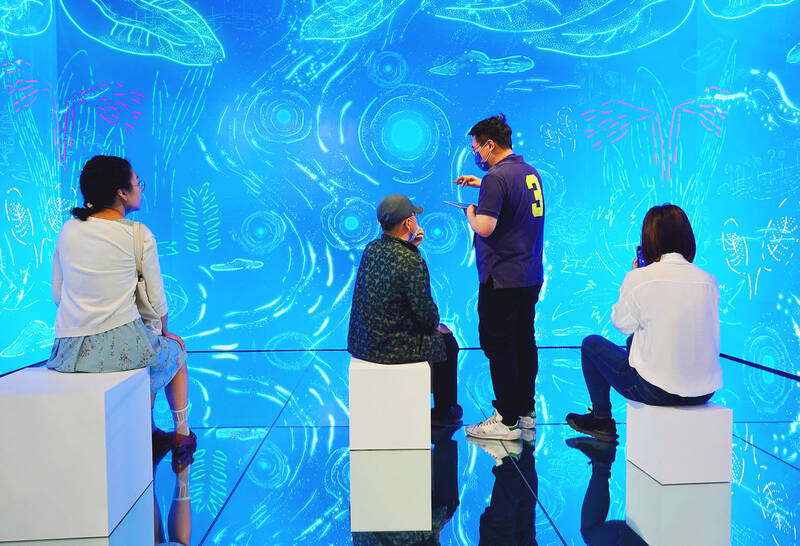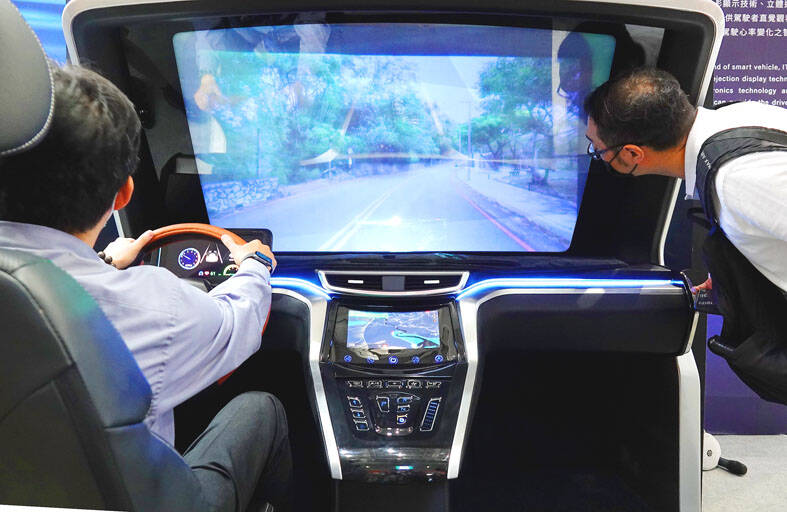LCD panel maker AUO Corp (友達) yesterday said it plans to convert an older-generation LCD fab in Taoyuan’s Longtan District (龍潭) into a microLED panel production site in preparation for rapid uptake of the new display technology in 2025.
The Longtan plant, dubbed Fab 5A, makes notebook computer panels, AUO said, adding that it would allocate 8.5-generation production capacity for notebook computer panels.
“MicroLED technology is highly linked to the front-end process of LCD technology, so we are preparing to upgrade an existing plant to produce the next-generation display technology,” AUO chief executive officer Frank Ko (柯富仁) told a media briefing in Taipei.

Photo: CNA
“The 5A fab and other factories in Longtan would be part of our future deployment of next-generation display technology,” Ko said.
AUO started converting its production lines in Longtan about two years ago.
The company’s microLED technology is to enter mass production in the second half of this year, it said.

Photo: CNA
That would make it one of two panel makers in the world capable of producing microLED panels this year, joining Samsung Electronics Co of South Korea.
AUO’s first microLED panels would be 1.39-inch panels used in smartwatches, it said.
Bigger panels used in TVs and public information displays would be available next year, it said.
The microLED panels would also be used in vehicle displays such as central information displays and smart cockpits, with mass production scheduled for 2025 or 2026 due to longer certification periods, AUO said.
As more companies join the microLED supply chain, AUO expects manufacturing costs to drop 50 percent every two years, a rule similar to Moore’s law in the semiconductor industry, AUO chairman Paul Peng (彭?浪) said.
Fairchild Semiconductor International Inc and Intel Corp founder Gordon Moore in 1965 said that the number of transistors in an IC doubles about every two years.
AUO said it estimates that the manufacturing cost of microLED panels would reach a sweet spot in 2025.
Mini LED panels remain much more pricey than their LCD counterparts, it said.
AUO allocates about 30 percent of its 2,000 research engineers for the development of the next-generation display technology to deliver higher resolution and better color performance than LCD technology, it said.
Separately, Innolux Corp (群創) said it is working with customers to develop microLED panels, without saying when it is to deliver its first such product.
The company said it is considering converting a 5.5-generation LCD fab to a microLED panel production base.
Other options include using the capacity to produce niche products, displays used in 5G or 6G devices or antenna for communicating with low Earth orbit satellites, Innolux said.
The 5.5-generation fab is entering a “green” idle state as the company phases out some commodity products, Innolux chairman Jim Hung (洪進揚) said.
The company is adjusting its manufacturing capacity for products with better margins and has transformed a 3.5-generation fab into a production site for advanced chip packaging technology, the company said.
Innolux also uses a 4-generation LCD manufacturing fab to produce X-ray sensors and a 4.5-generation fab to make e-paper displays, the company added.
The company said it expects to launch a project with Vedanta Group in June after receiving Indian government approval for subsidies.
Innolux has signed an agreement with Vedanta to help the Mumbai-based firm build a flat-panel production line in India and help license its intellectual property.

Sweeping policy changes under US Secretary of Health and Human Services Robert F. Kennedy Jr are having a chilling effect on vaccine makers as anti-vaccine rhetoric has turned into concrete changes in inoculation schedules and recommendations, investors and executives said. The administration of US President Donald Trump has in the past year upended vaccine recommendations, with the country last month ending its longstanding guidance that all children receive inoculations against flu, hepatitis A and other diseases. The unprecedented changes have led to diminished vaccine usage, hurt the investment case for some biotechs, and created a drag that would likely dent revenues and

Macronix International Co (旺宏), the world’s biggest NOR flash memory supplier, yesterday said it would spend NT$22 billion (US$699.1 million) on capacity expansion this year to increase its production of mid-to-low-density memory chips as the world’s major memorychip suppliers are phasing out the market. The company said its planned capital expenditures are about 11 times higher than the NT$1.8 billion it spent on new facilities and equipment last year. A majority of this year’s outlay would be allocated to step up capacity of multi-level cell (MLC) NAND flash memory chips, which are used in embedded multimedia cards (eMMC), a managed

CULPRITS: Factors that affected the slip included falling global crude oil prices, wait-and-see consumer attitudes due to US tariffs and a different Lunar New Year holiday schedule Taiwan’s retail sales ended a nine-year growth streak last year, slipping 0.2 percent from a year earlier as uncertainty over US tariff policies affected demand for durable goods, data released on Friday by the Ministry of Economic Affairs showed. Last year’s retail sales totaled NT$4.84 trillion (US$153.27 billion), down about NT$9.5 billion, or 0.2 percent, from 2024. Despite the decline, the figure was still the second-highest annual sales total on record. Ministry statistics department deputy head Chen Yu-fang (陳玉芳) said sales of cars, motorcycles and related products, which accounted for 17.4 percent of total retail rales last year, fell NT$68.1 billion, or

In the wake of strong global demand for AI applications, Taiwan’s export-oriented economy accelerated with the composite index of economic indicators flashing the first “red” light in December for one year, indicating the economy is in booming mode, the National Development Council (NDC) said yesterday. Moreover, the index of leading indicators, which gauges the potential state of the economy over the next six months, also moved higher in December amid growing optimism over the outlook, the NDC said. In December, the index of economic indicators rose one point from a month earlier to 38, at the lower end of the “red” light.